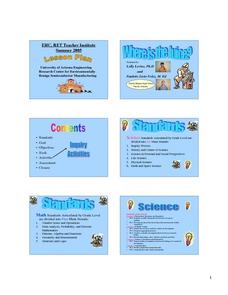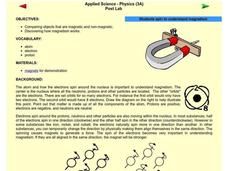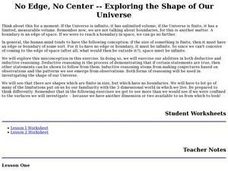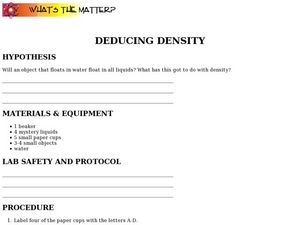Curated OER
Taking a Stand: Pros and Cons of Forest Fires
Learners explain the components of fire, explain how forest fires impact man and the environment, analyze data in order to recognize areas that are at risk for forest fires, make recommendations based on research.
Curated OER
Sleet and Hail Have Their Own Seasons
Second graders explain the definition of hail and sleet. In this precipitation instructional activity, 2nd graders discuss when hail and sleet fall and the results of hail falling.
Curated OER
The Dirt on Worms!
Fourth graders make predictions, observe, collect and record data. They investigate several soil and worm websites. Finally, 4th graders write a letter to The President which defends earthworms by explaining their value to the United...
Curated OER
Contours, Curves & Lines
Learners discover how straight lines and curves function in both art and the science of conservation tillage by building model "hills" and experimenting on them.
Curated OER
Introduction, Advance Organizer, and the Problem
Students describe the three-phrase process for designing and developing energy-efficient buildings. They develop solutions and identify ways to make homes more comfortable and productive in regards to energy.
Curated OER
How can pH be used to determine possible product tampering?
Learners investigate the strength of acids and bases experimentally. They answer the question, "How can pH be used to determine possible product tampering?" by testing acids and bases with litmus paper.
Curated OER
Good Food, Good Health
Students investigate how food provides energy for the human body. In this physical health lesson, students access online resources to identify how certain foods can affect their health. Students discuss how many servings of each food...
Curated OER
Where Is The Juice?
Students are introduced to the component's of Ohm's Law. In groups, they practice their problem solving skills by reviewing problems solved earlier. They participate in activities that help them gather information on the importance of...
Curated OER
Biomedical Imaging
Students use guided questions and research to compare two biomedical imaging methods. they effectively present their findings to the class. Students use new technical knowledge to summarize and compare new techniques with those they...
Curated OER
Magnetism
Students study magnetism. In this science instructional activity, students participate in an activity to discover how electrons in a magnet move. Students identify items around the classroom that are magnetic.
Curated OER
The Same But Different
Third graders observe a frozen container filled with ice and discuss what happens when the ice sits out in the room. They practice measuring the mass and volume of the ice, watch as the frozen container is placed in a warm water bath to...
Curated OER
Remember the Egg!
Learners investigate how to see, describe and draw faint or subtle features on an object which is thought of by most people as having a smooth, featureless surface. The exercise is important to reinforce skills in making observations...
Curated OER
No Edge, No Center -- Exploring the Shape of Our Universe
Students examine various "spaces" (including ones that are one-dimensional, two-dimensional, and three-dimensional). For each space, they will examine what it means to have or not have an edge, or to be finite or infinite.
Curated OER
Properties of Color
Second graders explore the properties of primary color and investigate what happens when primary colors are mixed. They listen to the story The Crayon Box That Talked and list the colors. They experiment mixing primary colors and...
Curated OER
How do protons stick together in a nucleus?
Young scholars explain that the Standard Model of the atom includes particles beyond protons, neutrons, and electrons. They describe the nucleus as conglomeration of quarks that manifest themselves as protons and neutrons.
Curated OER
Heat and Temperature
Ninth graders explore the relationship between heat and temperature. After performing experiments, 9th graders record their observations and discuss the results. They investigate the properties of heat and explore how energy possessed...
Curated OER
Naturally Magnetic Elements
Students explore naturally magnetic elements. For this magnets lesson, students examine the periodic table of elements. Students discover the parts of an atom and determine which three elements are magnetic.
Curated OER
Toying Around with Newton's Laws
Eighth graders identify balanced and unbalanced forces that affect the movement of objects and Newton's three Laws of Motion. Students also design a contraption utilizing Newton's Laws of Motion that will launch a marshmallow five meters.
Curated OER
Solution Shapes
Eighth graders examine different solutions. In this solution material lesson students complete a lab activity and several worksheets.
Curated OER
De-composers - Terrarium
Students explore the environment by building a mock ecosystem. In this rainforest analysis lesson, students define many environmental and rainforest related vocabulary terms and discuss the current status of our planet's rainforests....
Curated OER
A Hilly Ride
Fifth graders investigate situations that show how kinetic and potential energy are exchanged. They determine how friction is a source of energy transfer from kinetic to thermal energy by experimenting with a car and track. They answer...
Curated OER
Centrifugal Force and Mandy Sue Day
Fourth graders explore the story Mandy Sue Day and investigate centrifugal force. They demonstrate the concept of centrifugal force, use analytical thinking and they conduct an experiment using centrifugal force. Students discuss the...
Curated OER
Deducing Density
In this deducing density worksheet, students follow the procedures to set up an experiment about objects floating in water and liquids of different densities, answer questions, collect data and complete charts.
Curated OER
Stellar Fingerprints: the Spectra of Stars
Students explain how an element can be identified using emission spectra. They relate the emission spectrum of hydrogen to its absorption spectrum and identify hydrogen absorption lines in the spectrum of stars.

























